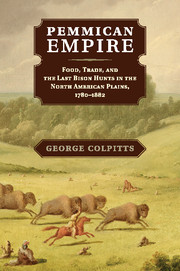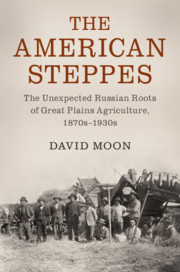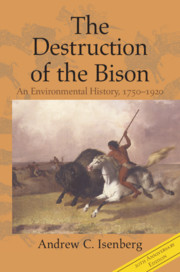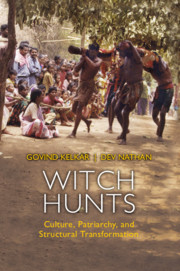Pemmican Empire
Food, Trade, and the Last Bison Hunts in the North American Plains, 1780–1882
$39.99 (G)
Part of Studies in Environment and History
- Author: George Colpitts, University of Calgary
- Date Published: March 2018
- availability: Available
- format: Paperback
- isbn: 9781107622890
$
39.99
(G)
Paperback
Other available formats:
Hardback, eBook
Looking for an examination copy?
If you are interested in the title for your course we can consider offering an examination copy. To register your interest please contact [email protected] providing details of the course you are teaching.
-
In the British territories of the North American Great Plains, food figured as a key trading commodity after 1780, when British and Canadian fur companies purchased ever-larger quantities of bison meats and fats (pemmican) from plains hunters to support their commercial expansion across the continent. Pemmican Empire traces the history of the unsustainable food-market hunt on the plains, which, once established, created distinctive trade relations between the newcomers and the native peoples. It also resulted in the near annihilation of the Canadian bison herds north of the Missouri River. Drawing on fur company records and a broad range of Native American history accounts, George Colpitts offers new perspectives on the market economy of the western prairie that was established during this time, one that created asymmetric power among traders and informed the bioregional history of the West where the North American bison became a food commodity hunted to nearly the last animal.
Read more- Offers a detailed explanation of the overhunting of bison herds north of the Missouri
- Provides an innovative environmental history of food exchange/food systems
- Draws upon fur company records and Native historical accounts
Reviews & endorsements
"At last we have the sweeping story of the destruction of the buffalo herds of North America, not as a subject of natural history but as an inquiry into man's depredations - from the first employment of the mammal's flesh and fat for the making of pemmican, which was the fuel of the fur traders that enabled the spanning of the continent to the Columbia Country, right through to the savage and debilitating corporate wars and rivalries across the forty-ninth parallel. Thoroughly researched and finely written, this distinguished contribution to historical studies tells the tragic story of a world we have lost as individuals, corporations, tribes, and Metis all sought to maximize their benefits in the profligate search for food and for hides. It is a story of universal importance."
Barry Gough, Wilfrid Laurier UniversitySee more reviews"George Colpitts has given us an utterly fresh and revealing look at the oft-studied story of the plains bison, its exploitation, and its near demise, and he has set that story in its full fascinating natural and economic context. This is a splendid work of environmental history."
Elliott West, University of Arkansas'Colpitts absolutely provides invaluable insight into the role of the pemmican empire in shaping an economic history of nourishment - physical, but also intellectual and social - in the buffalo commons …' Brenda Macdougall, Environmental History
'Herein lies the greatest strength of Colpitts’ work, and the aspect of his scholarship which may prove most influential. Pemmican is understood here not merely as a product, but as a process - the name comes from the Cree pemmican or pemigan, meaning 'he makes grease.' This draws our attention to the work involved in making pemmican, and to the work which its amazing caloric capacity facilitated. It also highlights pemmican as more than just a combination of meat and fat: it was the result of human decision-making, a tangible expression of the producer’s relationships with the animals, people, and economies around them.' Scott P. Stephen, British Colombian Quarterly
Customer reviews
Not yet reviewed
Be the first to review
Review was not posted due to profanity
×Product details
- Date Published: March 2018
- format: Paperback
- isbn: 9781107622890
- length: 317 pages
- dimensions: 230 x 153 x 20 mm
- weight: 0.49kg
- contains: 25 b/w illus. 7 maps
- availability: Available
Table of Contents
Introduction
1. Changing food-energy regimes in the northern fur trade, 1760–90
2. The pemmican bioregion, 1790–1810
3. Food fights and pemmican wars, 1790–1816
4. Selling bison flesh in the British market after 1821
5. Commercial war zones in the bison commons, 1835–50
6. Ending the pemmican era
Conclusion.
Sorry, this resource is locked
Please register or sign in to request access. If you are having problems accessing these resources please email [email protected]
Register Sign in» Proceed
You are now leaving the Cambridge University Press website. Your eBook purchase and download will be completed by our partner www.ebooks.com. Please see the permission section of the www.ebooks.com catalogue page for details of the print & copy limits on our eBooks.
Continue ×Are you sure you want to delete your account?
This cannot be undone.
Thank you for your feedback which will help us improve our service.
If you requested a response, we will make sure to get back to you shortly.
×



